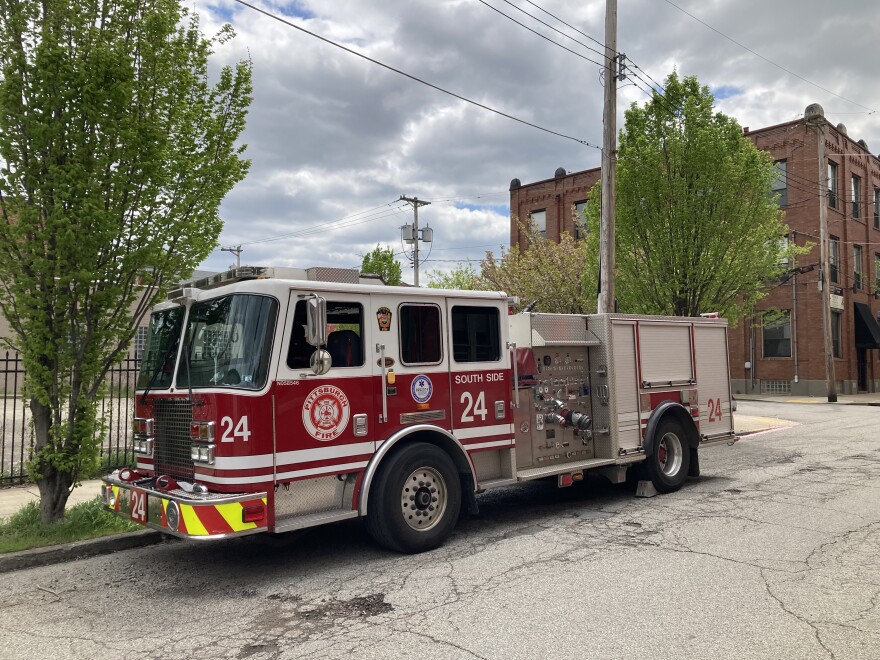The City of Pittsburgh and the union representing its firefighters have agreed to a new five-year contract, officials announced Friday. The new agreement provides at least a 4% wage increase to all union firefighters and higher increases for deputy and battalion chiefs.
The contract also provides six months of paid parental leave. Unlike police and EMS workers, firefighters have been the only full-time city employees without parental leave, according to Mayor Ed Gainey’s office.
The city and Pittsburgh Fire Fighters, IAFF Local No. 1 issued a joint statement Friday celebrating the agreement.
“Our firefighters have secured significant pay increases that help defray the costs of inflation and have secured new benefits, including parental leave, pregnancy loss leave, and health screenings for early illness detection,” said union president Ralph Sicuro.
The parental leave applies to all firefighters, and those who have had a child within the last year will qualify to use the benefit if council approves the contract. But city officials say they hope it will also help recruit more women to the department.
An audit of the bureau released last month highlighted the need for parental leave and other measures to increase the remarkably low number of female firefighters in the city. Just five of more than 700 fire bureau employees are women.
Jake Pawlak, the city’s deputy mayor and director of the Office of Management and Budget, told WESA that the city is looking at a myriad of ways to recruit more women to the job.
“We want to attract more women to this profession in a very broad way,” Pawlak said. “I hope [parental leave] will help with that.”
The city also changed requirements for the bureau’s physical qualification this year in an effort to “eliminate unfair barriers,” according to Pawlak.
The new contract sets out base wage increases for all five years of its duration. All firefighters will get at least a 4% bump in 2024, followed by hikes of 2.5% in 2025, 3% in 2026, 4% in 2027 and 8% in 2028. Captains and lieutenants will get a 4.4% increase in 2024-2027 and an additional 4.5% in 2028. Battalion chiefs and deputy chiefs will receive a 5.25% raise each year of the contract.
But the contract also stipulates that after 2025, deputy chiefs will become non-union positions. There are currently six deputy chiefs in the bureau. Pawlak said the change reflects the managerial nature of the deputy chief role.
“I think there are historical reasons why they wound up within the union, but we both agreed that that shouldn't be the case into the future,” Pawlak said.
The contract also changes how overtime shifts are assigned, which Pawlak said could save the city money. The bureau currently distributes overtime opportunities based on rank, which means higher-ranking firefighters could respond to overtime shifts, costing the city more than if lower-ranking firefighters responded.
The new contract would afford lower-ranking firefighters the right of first refusal on overtime shifts. The union referred to it as “a collaborative effort to support the city's financial well-being.”
“Our union has agreed to unscheduled work-time adjustments and the strategic repositioning of our highest-ranked officers,” Sicuro said. “This change will help ensure more efficient management of the Fire Bureau to meet the increasing demands on our dedicated firefighting force while fostering a positive relationship between the union and the City.”
Pawlak said that relationship is also illustrated by the city’s agreement to involve union members in decisions about fire station upgrades, a project the Gainey administration expects to embark on next year. Pawlak noted that the stations were built when Pittsburgh’s population was double the current size, so some stations may be consolidated.
“Everyone understands that we need to take a thorough, ongoing look at the potential for the consolidation of stations,” Pawlak said. He said that would include study of "what a thoroughly modern fire station requires for the employees that work there in terms of kitchen and restroom and sleeping facilities.”
Gainey issued a statement Friday in support of the contract:
“This agreement ensures that the brave men and women of our Fire Bureau are fairly compensated for the vital and dangerous work they do keeping our residents safe, while giving the City the opportunity to structure work rules and promotions in a way that will improve the fire service," said Gainey.
City Council is expected to vote on the contract next month in a process that would also include reopening the 2024 budget to reallocate funds for the bureau. But Pawlak said the changes would merely involve shifting funds around rather than an increase in overall spending, because the recently passed budget already included wiggle room for contract increases.
“We’re very confident that the budget as passed by council has appropriate funds," Pawlak said. "We just need to place them in the right accounts at this point.”





